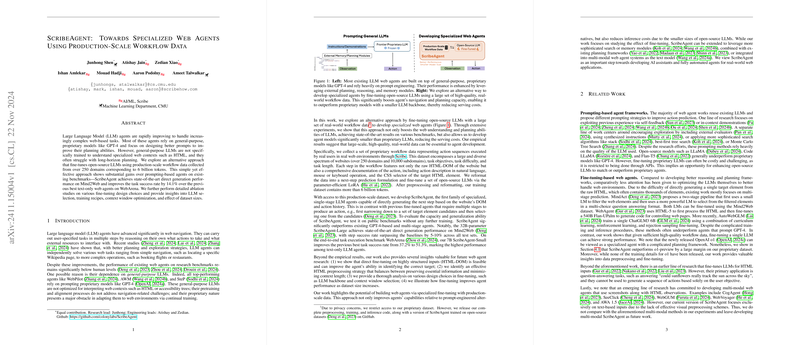Examination of the ScribeAgent Paper: Specialized Web Agents via LLM Fine-Tuning
The paper "ScribeAgent: Towards Specialized Web Agents Using Production-Scale Workflow Data" introduces an innovative paradigm for enhancing the performance of LLM-based web agents. The paper tackles one fundamental limitation of general-purpose LLMs: their struggle with web-specific tasks due to a lack of training in specialized web contexts such as HTML navigation and long-horizon planning tasks. To address these issues, the authors present ScribeAgent, a framework for fine-tuning open-source LLMs using vast, real-world workflow data.
Fine-Tuning LLMs with Workflow Data
The researchers propose an alternative to model prompting by fine-tuning open-source LLMs with high-quality workflow data. The dataset spans over 250 domains and 6 billion tokens, collected from actual user interactions via the Scribe platform. The focus is to enhance models with practical, real-world web navigation skills by exposing them to large-scale, diverse inputs that include HTML-DOM structures and action descriptions.
Numerical Results and Performance Enhancements
Empirical results show ScribeAgent’s significant improvements over contemporary prompt-based agents. Specifically, on the WebArena benchmark, ScribeAgent demonstrated a task success rate improvement of 14.1\% over the best-performing text-only web agents, underscoring the efficacy of specialized fine-tuning. The model also achieved state-of-the-art results in the Mind2Web benchmark, excelling in element accuracy and step success rate.
Effective Fine-Tuning Strategies
This work includes detailed ablations on fine-tuning parameters, highlighting important findings such as the selection of the LLM backbone. Models with larger parameters generally performed better, although the increase in computational resources required during fine-tuning and inference is non-trivial. The paper also identifies context window scaling as influential to exact match metrics, albeit with diminishing returns on calibrated exact match due to the complexity of managing extended HTML contexts.
Broader Implications and Future Directions
The implications of this research touch both theoretical and practical domains in AI. Theoretically, it emphasizes the need for domain-specific LLM training to overcome inherent limitations of general-purpose models. Practically, ScribeAgent's approach offers cost-effective solutions by leveraging smaller open-source models fine-tuned for specific tasks, offering potential reductions in service costs without sacrificing performance.
Future work as noted in the paper could explore augmenting ScribeAgent with planning tools and multi-modal input processing capabilities to further enhance navigation strategies and broaden application scopes. The potential for integrating specialized agents like ScribeAgent into more complex AI systems, such as those incorporating visual data or multilingual capabilities, presents a promising trajectory.
Conclusion
ScribeAgent sets a precedent for the future of web navigation agents by showcasing the substantial benefits of leveraging production-scale workflow data for specialized LLM fine-tuning. The approach fosters a shift towards utilizing tailored data to cultivate models that are not only adept at understanding specific web environments but also more resource-efficient. The insights from this paper are bound to inspire further AI research focused on task-specific enhancements and optimization strategies.
